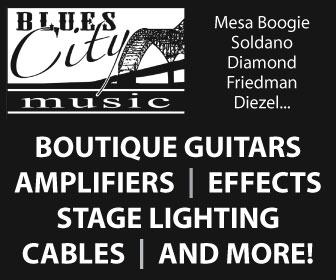Peter Karp
Chorus and Verse Spotlight
According to Peter Karp, the ability to play live separates the serious musicians from the amateurs.
"If you are not playing live, then you are not a musician, you are a hobbyist," Karp said.
"[Playing live] is the most important aspect of being a musician," Karp added. "It's where you hone your craft, where you test yourself and grow."
Karp, singer/songwriter, guitarist, keyboardist and harmonica player, makes a conscious effort to leave things unrehearsed.
"My band and I never rehearse," he said. "Never. If you rehearse your set, you take the spontaneity out of it, you lose the audience. There is nothing more boring than a rehearsed act. Music is about feeling and interpretations."
Being told this by a virtual blues legend like Willie Dixon can't help but make one gravitate towards leaving things unrehearsed.
Without radical arrangement changes, sets should not be repeated, Karp said.
"Never make a set list [and] always do your own tunes," he said.
Karp began writing songs at five but didn't become a live performer until age 32.
"Before that, I wrote songs for other people to sing," he said. "It was at about that time I realized I had something to say, I had a voice."
Karp's long list of early inspiration includes Dixon, the Beatles, Rolling Stones, James Brown, the Temptations and Albert King.
Karp's studio work is personable, humorous, and truthful. When recording, the from-the-hip performer is backed by musicians who take his no-nonsense approach to the next level.
"A good band, like mine, understands the concept of what you are trying to do," he said. "They understand that the players are a vehicle to make the songs touch the audience. I find this particularly true with great drummers. A great drummer will listen to the song and put a heartbeat to it. A great drummer understands dynamics.
"A great band has no ego. I've found the better the player, the less [the] ego. And, better doesn't necessarily mean technically better. Great players understand that it is a collective art. You work together to make something greater than the individual."
Karp never uses a home studio or tape recorder for writing, he said. Instead, he fills a book with lyrics and ideas and puts it all together like a puzzle.
Lyrics are the key and come before the music, he said.
"If you don't have anything to say, putting it to great music just makes a bad song into a big, bad song," he said.
Being yourself is important, he said.
"When you're just starting out, you will cop other writer's styles," Karp said. "Stay at it long enough and, if you take it seriously, you will develop your own thing. Never be afraid to be who you are. Unless, of course, you are a freak show. Still, that's more entertaining than a cover band."
Still, when it comes to creating a song, Karp thinks playing live is key. It's a chance to get the opinion of a common person, not a professional musician, he said.
The common person's opinions are more reliable than the professional's, Karp said.
"Songs are about communication and human interaction", Karp said. "Whether it's anger, sex, violence, love, tranquility, sadness, happiness or whatever you feel, you are trying to convey it to other people. You can't know if what you're doing works or not unless you play for a live audience. Take your criticism from the common man, not the pro.
"And, never go to songwriting classes. If you want to go, just send your money to me and I'll tell you how bad your shit is. Most of those people wouldn't know a good song if it kissed 'em on the lips."
Karp's ideas come from the concrete and unknown.
"I believe John Lennon was right when he said that songs are out there, you just have to tune into them before someone else does," Karp said. "I believe inspiration is mystical, but there is nothing mystical about writing. Writing is work. Fun work, but work."
Upcoming plans include working on the road to finish his new CD, "The Turning Point", and seeing where his path of spontaneity leads.
"Life is a great mystery. Music makes it mean something," Karp said.
Karp plays regularly and his show dates can be found at his web site www.peterkarp-roadshow.com.
On Saturday, May 31 from 8 p.m. to 11 p.m., Karp plays the Red Bank Riverfest on that town's waterfront.
"Peter Karp's Equipment List:"
1995 Gibson L4
1995 Fender Telecaster
1981 ('57 reissue) Fender Strat
1985 Martin Herringbone D28
Classic Fender Vibrolux
1999 Johnson Dobro (with lace sensor pickup)
Dean Steel Guitar (acoustic-electric)
Yamaha P-80 electric piano
100w Yorkville keyboard amp
Marine Band harmonicas

Josh Davidson has written music feature articles for Jersey Style and served as the Jersey Shore rock columnist for Steppin' Out Magazine. Other music writing credits include Aquarian Weekly, Jersey Beat, Backstreets and njcoast.com. He has written free-lance for the Asbury Park Press' Community Sports section and has written featured articles for its news section, as well as covering campus news and sports weekly for the Signal, the College of New Jersey's (formerly Trenton State College) student newspaper. He has worked as a staff writer for The Independent, and his work for Greater Media Newspapers has also been published in the News Transcript. He is a former beat reporter for the Ocean County Observer who presently is a news writer for Symbolic Systems Inc. supporting the US Army's Knowledge Center. His music writing covers a vast range of topics, from the current cover band craze, highs and lows of the original scene, to the early days of the Jersey Shore rock scene in Asbury Park. He is also a musician, having written hundreds of songs as a singer/songwriter, and playing them out as a solo/acoustic artist. He has also played with cover bands, including It Doesn't Matter, and several original bands, including as the guitarist for the solo project of singer/songwriter Dave Eric. He continues to work on solo material and is presently the guitar player for Jersey Breeze.









